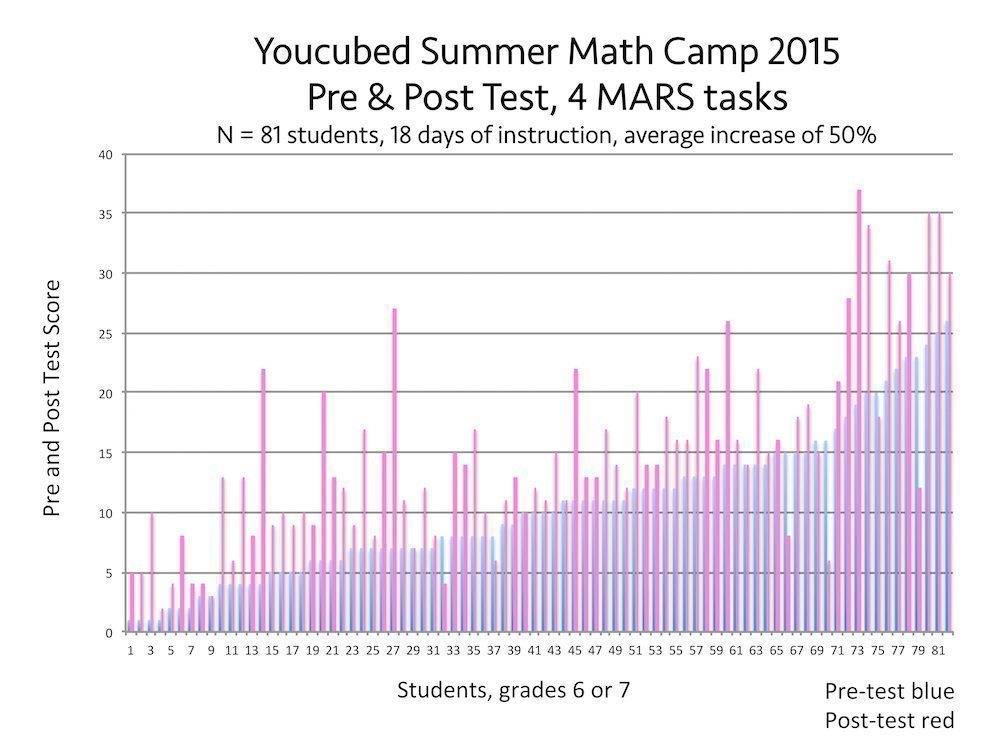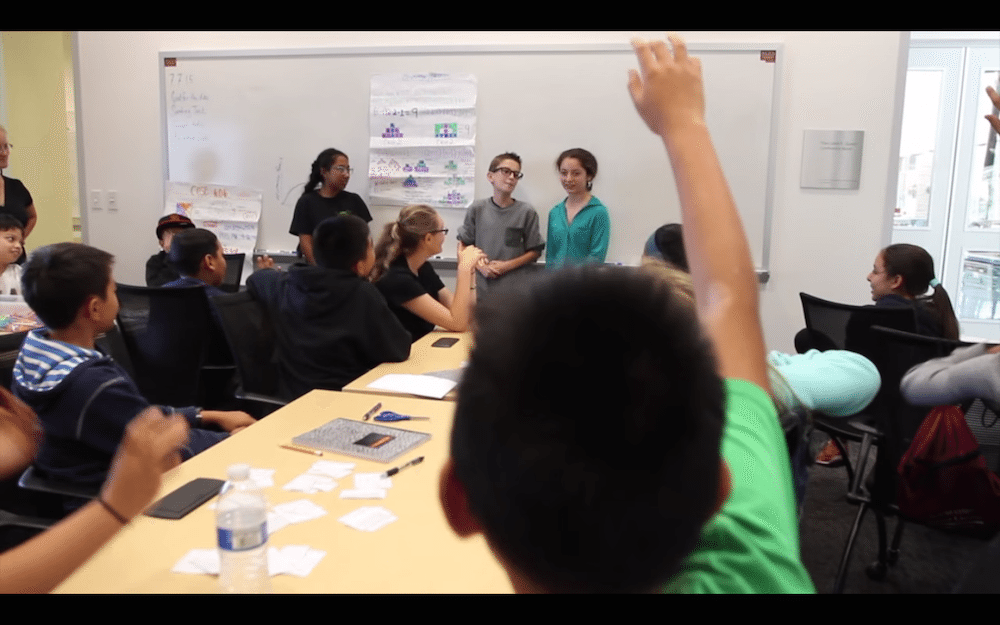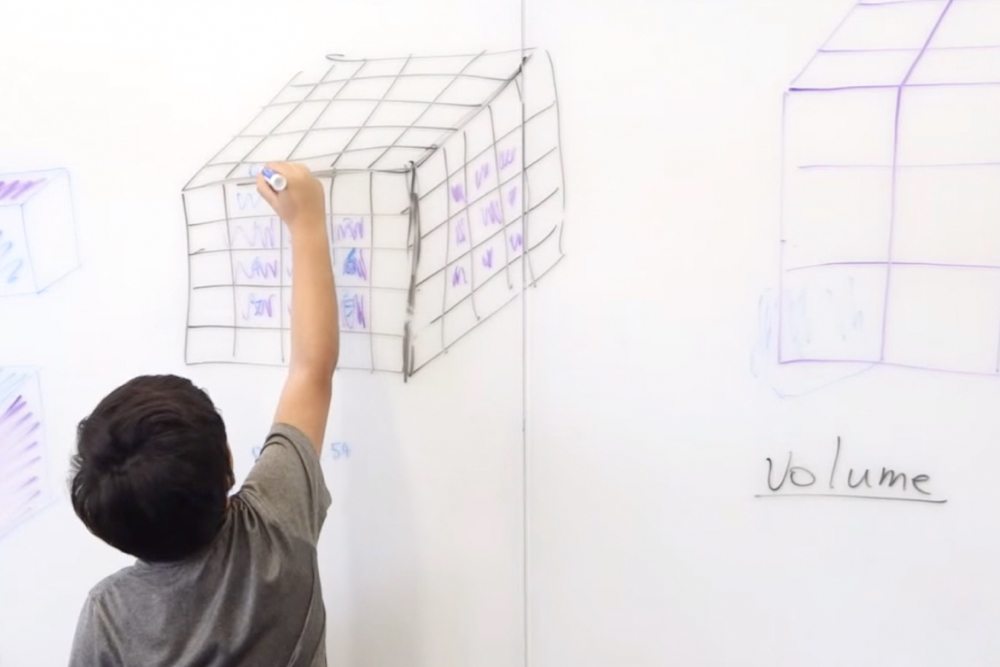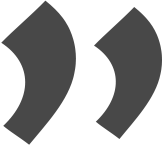We first designed and taught a youcubed summer camp at Stanford to put our Mathematical Mindset approach to teaching into practice. The camp was a great success and since that time teachers across the US and the world have taught the youcubed camps with similar success. Our summer camp page under the Evidence tab shares the research evidence from our camp and from the camps taught by others. Below we give further details of the teaching approach we used.
If you would like to learn how to teach using a Mathematical Mindset approach, or if you would like to run your own camp, we encourage you to attend one of our workshops. Some of the summer camp workshops are online and some are in person at Stanford. The workshop includes a copy of the camp curriculum, which is available for grades K-1, 2-3, 4-5, and 6-9. We also have an online course that teaches the approach and includes over 30 videos from summer camp.
Planning to host a youcubed Mathematical Mindset Summer Camp? Complete this survey and tell us about it!
Read a news article by teachers who attended our training and hosted their own camp!
Ready to explore hands-on learning opportunities?
A summer of math fun for everyone involved

Our youcubed summer camp is organized around big ideas. The middle school version of the camp includes four big ideas of:
- Number sense
- Learning to generalize
- Algebra as a problem solving tool
- Mathematics as pattern seeking
What made this camp unique?
Woven throughout the curriculum and teaching are the actions and messages that help students develop a growth mindset. We shared with students that everyone can do well in math; that mistakes, struggle and persistence are all important; that mathematics is an open, growing subject, (as opposed to a closed, fixed subject); and that communicating, reasoning about, and justifying ideas are central acts in the work of mathematics. Our students participated in the free online course, How to Learn Math for Students, to support these important messages. Our students engaged in challenging tasks that included visual representations. Our classroom culture was based on group work where all ideas were valued.
In our original camp that we taught at Stanford, the youcubed team taught mindset and brain messages to local 6th and 7th grade students. We also – importantly – taught mathematics in ways that encouraged mathematical mindsets. The camp had a huge impact on the students. After 18 days of math teaching the students improved their scores on standardized mathematics tests by an average of 50% (equivalent to 2.8 years of school).

Do you want to try our curriculum?

Our curriculum was designed around problem solving. Students were given low-floor, high-ceiling tasks, showing them that everyone can engage and succeed in high-level mathematics. The visual and open-ended presentation of mathematics helped students find their personal connections to topics, realizing their own potential, as well as their ability to contribute to the learning of others. To try our curriculum, sign up for a workshop or browse our site for ideas about low-floor, high-ceiling tasks. Also, see WIM for more information, including lesson plans and support materials, for many of our lessons.
Jo teaching a dot card number talk at our summer camp
A high achieving student reflects on his learning during youcubed summer camp
 “I think I’ve felt a big difference from this camp. Mostly because everybody here has been so encouraging and stuf. I would say before I was really worried to go into math class and learn and um be a person who asks a question and have that question be something that’s already been asked, or be thought of as a dumb question. But now I know that there are no such thing as dumb questions, and any question you ask is important, and it’s important to know that you can always learn and succeed in math.”
“I think I’ve felt a big difference from this camp. Mostly because everybody here has been so encouraging and stuf. I would say before I was really worried to go into math class and learn and um be a person who asks a question and have that question be something that’s already been asked, or be thought of as a dumb question. But now I know that there are no such thing as dumb questions, and any question you ask is important, and it’s important to know that you can always learn and succeed in math.” Katie
Katie
 “I used to think that smart was all about speed, knowing things right away and knowing that I’m a really slow person, I thought that I was stupid and it’s really different. It’s completely different ‘cause now I know that smart doesn’t have to be right away, now I can take my time, it feels good.”
“I used to think that smart was all about speed, knowing things right away and knowing that I’m a really slow person, I thought that I was stupid and it’s really different. It’s completely different ‘cause now I know that smart doesn’t have to be right away, now I can take my time, it feels good.”  Danielle
Danielle
 “So feeling locked up doesn’t help your understanding of math. You have to do the same thing every day if you’re basically locked up. I think it’s a lot easier to understand math when it’s visual and you can pass ideas by, like just roam free and come up with other answers that you wouldn’t have came up with if it wasn’t a visual problem.”
“So feeling locked up doesn’t help your understanding of math. You have to do the same thing every day if you’re basically locked up. I think it’s a lot easier to understand math when it’s visual and you can pass ideas by, like just roam free and come up with other answers that you wouldn’t have came up with if it wasn’t a visual problem.”  Isaac
Isaac
 “I guess in a way making the mistakes in it was super fun, and just learning from the mistakes, it was interesting, ‘cause I’ve never had such a visual version of math, where making mistakes was so acceptable and you were able to look at it as, as you were so close but you could get there from learning from that mistake, and I’ve never had that experience in another classroom and that’s probably what made it so special.”
“I guess in a way making the mistakes in it was super fun, and just learning from the mistakes, it was interesting, ‘cause I’ve never had such a visual version of math, where making mistakes was so acceptable and you were able to look at it as, as you were so close but you could get there from learning from that mistake, and I’ve never had that experience in another classroom and that’s probably what made it so special.” Isaiah
Isaiah
 “I like it because the problems are harder here, not harder but like more challenging, and if you don’t know the answer, you can raise your hand and we’ll think about it together, and try to come up and we’ll do talks in our group, and we’ll all try to figure it out if we don’t understand, we’ll try to explain it to each other.”
“I like it because the problems are harder here, not harder but like more challenging, and if you don’t know the answer, you can raise your hand and we’ll think about it together, and try to come up and we’ll do talks in our group, and we’ll all try to figure it out if we don’t understand, we’ll try to explain it to each other.” Gabrielle
Gabrielle


